To further understand the structure, features and driving principles of alternative social media sites, Pew Research Center researchers conducted an audit of the seven sites analyzed at length in Chapter 1 of this report – BitChute, Gab, Gettr, Parler, Rumble, Telegram and Truth Social. Researchers visited each site in April 2022, examining characteristics ranging from site design to descriptive labels and privacy protections, and then verified that these findings still held true in September 2022. Sites were selected based on their audience size in December 2021 and their media coverage (see methodology for more details on the site selection process).
While the alternative social media sites studied here have predominantly Republican audiences and, in some cases, have received substantial funding from conservative donors, none state a clear partisan or ideological orientation in their “About” page or similar sections of their websites. Only one site – Truth Social – explicitly describes itself as nonpartisan, saying on its homepage that it “encourages an open, free, and honest global conversation without discriminating against political ideology.” The remaining sites do not mention a political orientation in the sections of their websites examined.
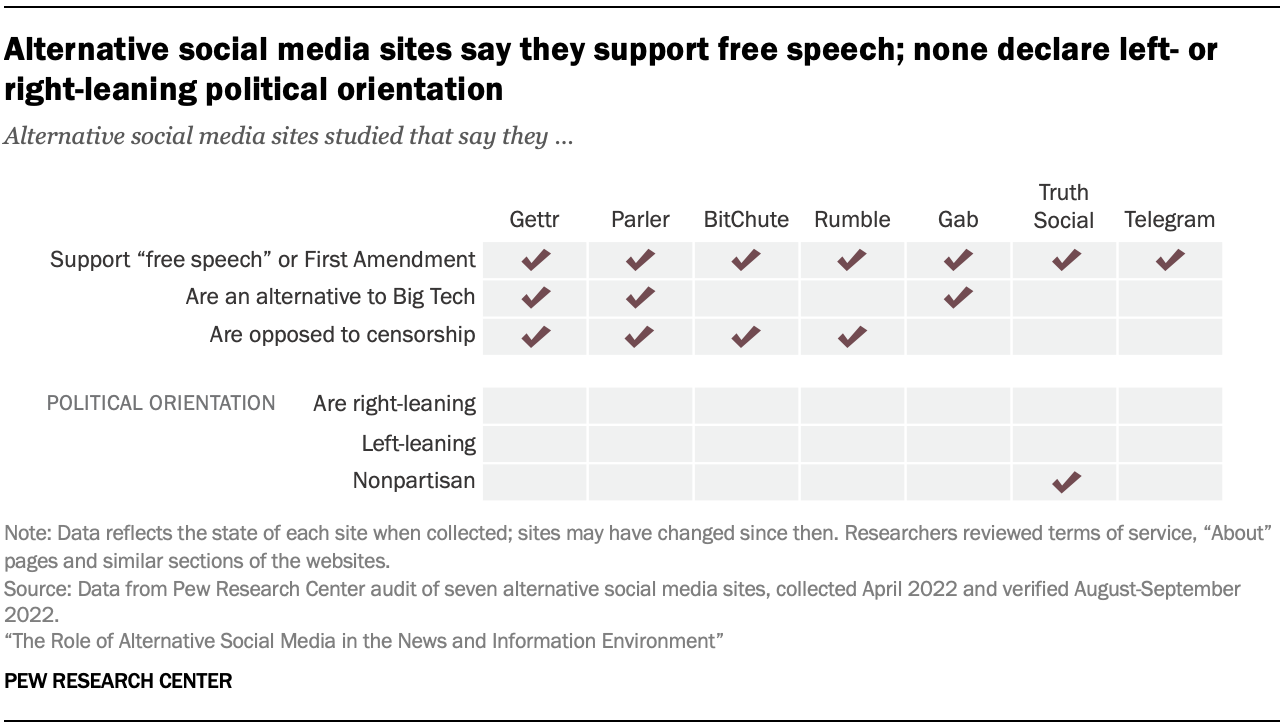
Conversely, all seven of the sites identify themselves as havens for free speech or enemies of censorship. In fact, each explicitly says that it supports free speech, and four (BitChute, Gettr, Parler and Rumble) specifically declare their opposition to censorship. Three sites – Gab, Gettr and Parler – also identify themselves as an alternative to Big Tech.
In expressing their support for freedom of speech, some sites criticize what they describe as “cancel culture.” Rumble, for example, advises readers that as a result of “cancel culture,” it supports “diverse opinions, authentic expression and the need for open dialogue.” Similarly, Gettr states that the site “champions free speech, rejects cancel-culture and provides a … platform for the marketplace of ideas.”
The three sites that explicitly identify themselves as alternatives to Big Tech often criticize those larger sites for not adequately protecting free speech. In describing its intent to “be the home of free speech online,” Gab, for example, notes, “We believe that users of social networks should be able to control their social media experience on their own terms, rather than the terms set down by Big Tech.” Similarly, Gettr invites users to “Be a part of history by joining the millions of Americans who are standing up to Big Tech and fighting for free speech and independent thought.”
Almost all alternative social media sites moderate at least some content and give users the chance to block content themselves
While freedom of speech is a key element of these sites’ identity, that does not mean there are not any restrictions on the content found there. All but one of the sites studied here (Gab) moderate user content beyond spam or legal requirements – either by removing posts or suspending or banning accounts deemed to be offensive or spreading misinformation.5 Some of the alternative social media sites studied remove posts (or the accounts that share them) for a number of reasons, including because the posts are offensive, contain violent or racist content, contain misinformation or, in some cases, because of their broader political viewpoint. (All of their larger competitors also use some form of moderation to address offensive speech or misinformation.)
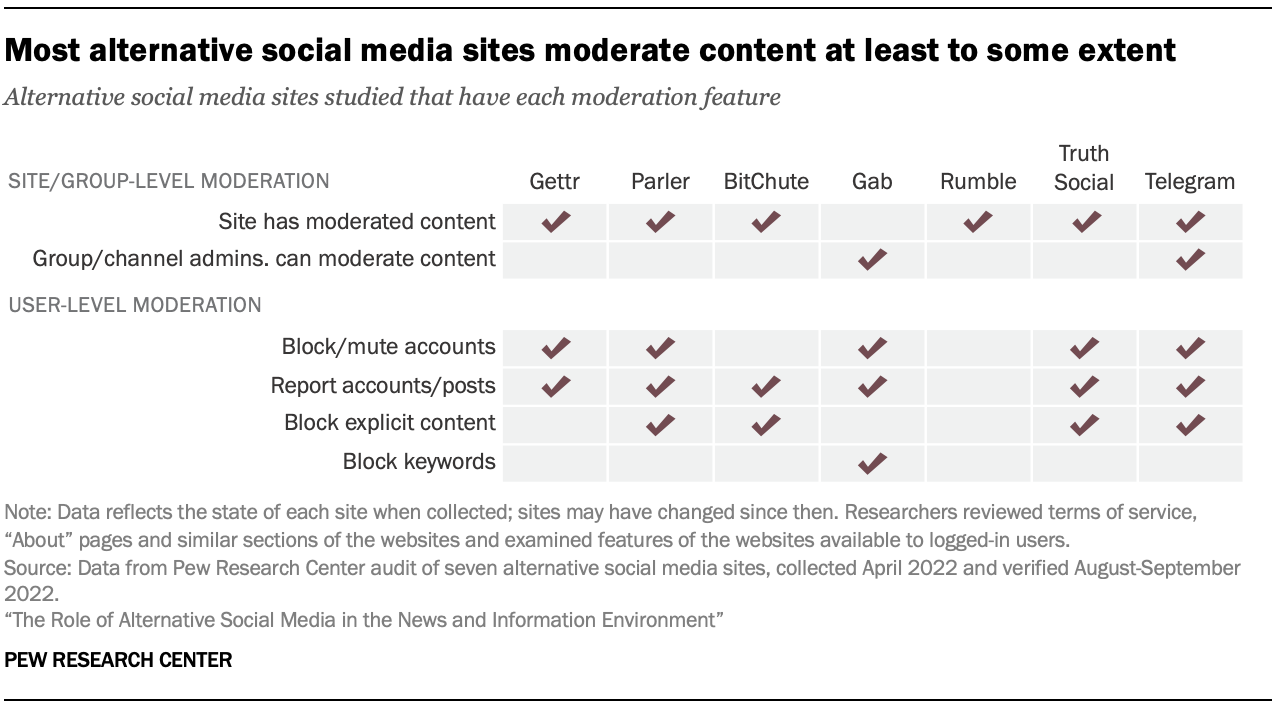
It is difficult to know what content is permitted on each site and what content is removed. But media and academic reports offer insight into some of the removed content. At least one site – Truth Social – reportedly removes content that is critical of certain political viewpoints. Truth Social’s terms of use also ban sexual and violent content, although Google said in late August 2022 that Truth Social must do more to remove content that incites violence in order to appear on its app store. Gettr, meanwhile, bans content that is “offensive, obscene … pornographic, violent, harassing, [or] abusive” in its terms of service, and has banned some White nationalist content and suspended at least one prominent account for offensive content.
Rumble proposed a content moderation policy in June 2022 that included post takedowns and account bans for obscenity, stalking and discrimination. And BitChute published a transparency report in June 2022 that showed what kinds of moderation they have implemented.
Sometimes, sites moderate content at least in part due to outside pressure. For example, Parler’s app was removed from the Google and Apple app stores after the Jan. 6 riots, and only returned to each after adding moderation features requested by Google and Apple. Similarly, in September 2022, Google requested that Truth Social add moderation features to remove violent content before allowing the app on their store. And Telegram removed “far right” and pro-ISIS channels after facing international government pressure and blocked or monitored content in Brazil in response to government requests there (though this content may still be available elsewhere).
Just one site – Gab – does not appear to moderate content in the same way the other sites do. While it does take steps to remove spam and follow legal requirements (such as banning posts that harm or exploit minors or complying with requests from law enforcement) and the site’s terms of service allow users to report threats and other abuse, researchers did not find examples of the site removing posts or accounts due to misinformation or offensive or harassing content. CEO Andrew Torba reportedly told NPR in a 2021 interview that “nobody is going to make him take down messages.” Instead of moderating content, Gab says in the help section of its website that it leaves it up to the user to mute or block accounts they find offensive. This hands-off moderation policy has led several hosting and payment providers to terminate their relationships with the company, especially after the site was linked to a 2018 shooting at a Pittsburgh synagogue.
Gab and Telegram also host groups – spaces where users can connect with each other to discuss topics and interests. These sites give group administrators tools to moderate posts within the group. On Telegram, groups and channels are similar and have similar moderation tools.
Many sites also give users control over the kind of content they see. Five sites let users block or mute other users from appearing on their news feed, six let users report either accounts or posts, and four allow users to block explicit content. One site (Gab) allows users to block posts with specific keywords from appearing in their news feed. Rumble, a video-focused site, is the only one that at the time of the study did not provide any of these user-level content moderation options.
In addition to moderating content more broadly, the larger, more established social media sites offer some of these user control features as well. Facebook began offering keyword blocking in 2018, but in 2021 replaced that with a feature that lets users hide specific posts or groups for 30 days; the site also lets users report accounts. Twitter also lets users mute keywords for varying lengths of time, block accounts and report accounts or posts. YouTube does not offer an easy way to block keywords, but does let users report content.
Almost all alternative social media sites emphasize privacy protections, but vary in exactly what they offer
User privacy on social media has become a flashpoint in recent years, with critics of social media sites raising concerns over the way those sites use user data and the tools users have to control who can see what they do online.
The number and nature of protections vary significantly from site to site, with Telegram, Gab and Parler offering the most privacy features.
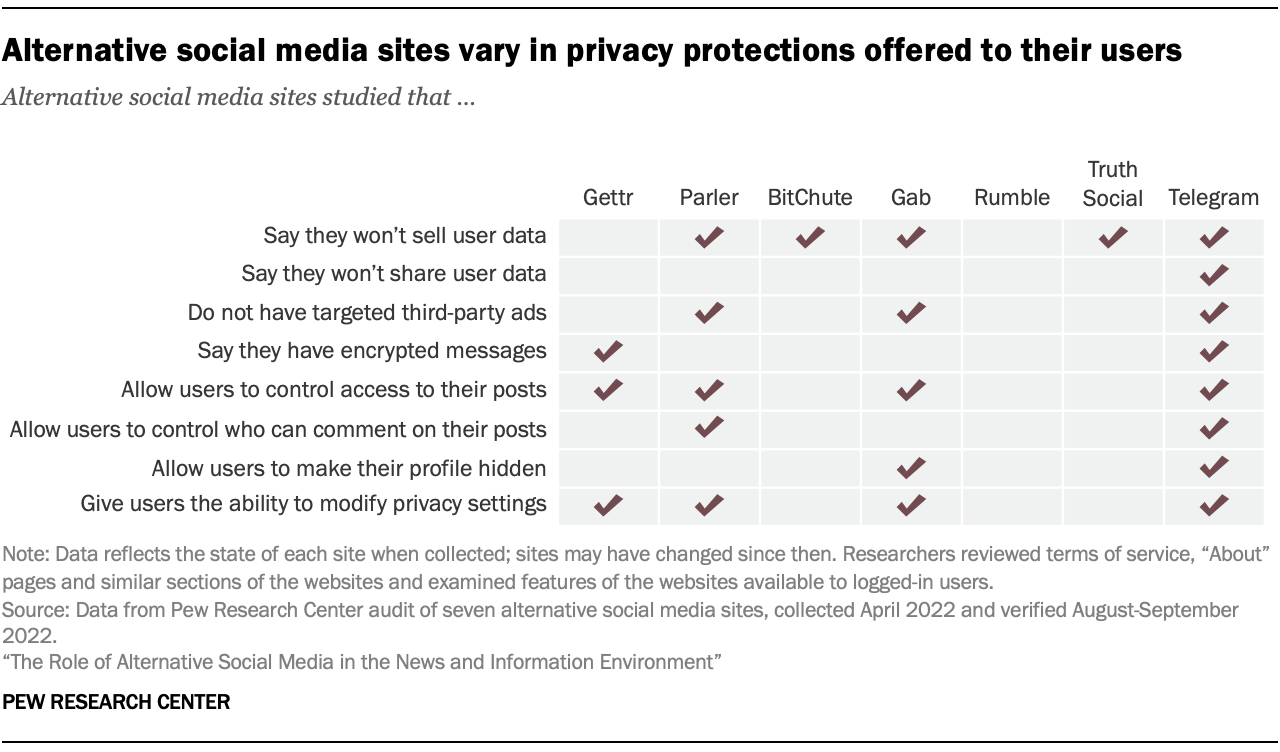
When the study was conducted, the most commonly offered privacy protection related to user data. Five of the seven sites examined say they do not sell user data (Gettr and Rumble are the only sites that do not promise this – they may or may not sell user data, but their privacy policies do not guarantee they will not). But even if most sites do not sell user data, there are other ways that users’ personal information could come into the hands of other entities. For example, sites can also share data with partners (including other companies) without charging for it and often without informing the user. Just one of these sites, Telegram, explicitly states that they do not do this.
Sites can also use the data they collect to sell third-party targeted ads, which allow advertisers to select the users they wish to reach based on detailed demographic information. Three of the seven alternative social media sites – Gab, Parler and Telegram – indicate that they will not sell third-party targeted ads.
A few of the sites studied offer other privacy features. Four of them – Gab, Gettr, Parler, Telegram – give users the ability to modify their privacy settings and allow users to control who can access their posts. Two of the sites – Parler and Telegram – also give users control over who can comment on their posts. And two – Gab and Telegram – give users the option of making their account completely private so that it does not come up in searches.
Aside from specific privacy protections, these sites also vary in the amount of information they ask for from their users. Beyond a username, which five of the seven sites ask for, four require an email address, two (Telegram and Truth Social) require a phone number, and two (Gettr and Parler) require either an email address or phone number. Two sites – Gettr and Truth Social – also require an age and birthdate in order to set up an account (see methodology for more details on how researchers determined what information is required to create an account in each site).
The privacy protections on more established social media sites are mixed. While Facebook, Twitter and YouTube say they do not sell user data, all three sites share user data with partners, although Facebook and YouTube seek permission from the user to do so. And all three sites offer targeted third-party ads – an often-criticized practice that personalizes ads based on user profiles.
Even when not sold or shared, the broad scope of data these sites can collect about users both on and off the site has prompted concerns from users and observers. But Facebook, Twitter and YouTube all offer some controls to the user over what information is shared, such as control over who can access their posts.
Most sites linked to high-profile backers; some sites also use other revenue streams
High-profile backers are linked to a majority of the alternative social media sites studied here, according to media coverage, which has connected some high-profile conservatives, tech entrepreneurs and others, to five of the seven sites examined here.
Major donors to Parler include a member of the Mercer family, which has backed conservative organizations such as The Heritage Foundation and Breitbart. Rumble’s investors include Ohio Republican U.S. Senate candidate J.D. Vance, venture capitalist and political donor Peter Thiel, and radio, podcast and Fox News host Dan Bongino. Truth Social was launched by former President Donald Trump after he was “indefinitely” or “permanently” suspended by Facebook and Twitter, a venture that was connected to a Special Purpose Acquisition Company (SPAC) that reportedly raised $1 billion.
Telegram is largely funded by CEO Pavel Durov, a Russian-born billionaire who currently lives in Dubai. A key investor in Gettr was China-born billionaire Guo Wengui, an outspoken critic of the Chinese government and colleague of former Trump adviser Steve Bannon.
Six sites (four of which are also among those with high-profile backers) also sell advertisements or have other revenue streams – from selling T-shirts to accepting donations or offering account upgrades. Two of the sites that are not connected to high-profile backers (BitChute and Gab) are the two employing the widest range of other revenue streams.
Account upgrades, subscriptions or advertising are the most common revenue streams. BitChute, Gab, Rumble and Telegram all offer some form of account upgrade. BitChute, for example, offers users bronze, silver and gold membership options, with each option increasing the number of channels an account can host, while Rumble has a similar series of account upgrades and packages largely aimed at content creators. Telegram’s premium upgrade relaxes limitations on storage and downloads and adds premium stickers and other features, while Gab also offers an account upgrade that removes ads and enables other features.
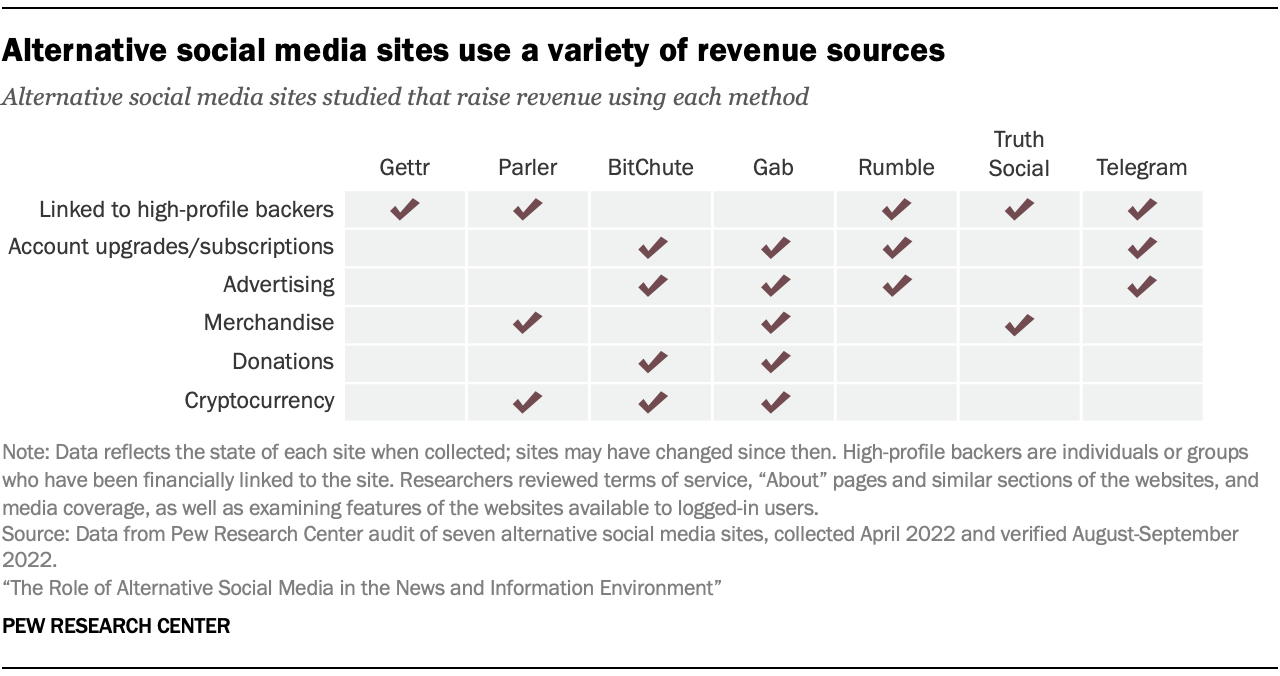
In addition, four of these sites – BitChute, Gab, Rumble and Telegram – sell advertising, either on the site itself (such as in the post feed) or in videos. Two sites – BitChute and Gab – accept user donations, including in cryptocurrency such as bitcoin. Parler is also exploring crypto as a revenue source through a non-fungible token (NFT) marketplace it hosts called DeepRedSky, which features NFTs from Parler itself as well as partners like The Babylon Bee.
Gab, Parler and Truth Social sell merchandise as another way to generate revenue. The Gab Dissenter Shop sells T-shirts, hats and accessories with various slogans, such as “Faith, Family, Freedom” and “Free Speech.” Parler sells similar merchandise tied closely to the theme of free speech, bearing slogans such as “STOP being silenced” and “I will not be cancelled.” The Truth Social store sells coffee mugs, drink koozies, and apparel branded with the word “Truth.”
Rumble has developed an additional set of revenue streams – selling infrastructure and advertisement services to Truth Social (as of mid-September 2022, it does not appear that Truth Social has activated this feature).
Alternative social media sites vary in how they organize user content
Like their larger, more established peers, alternative social media sites vary in their basic structure. Most of these differences are rooted in the format of content that users can post and the ways in which sites present those posts and replies.

Two sites – BitChute and Rumble – focus on videos. The main pages of these sites show videos in a grid, with featured videos at the top.
Among the five sites that host a wider range of content, distinctions lie in the way they organize those posts as well as in the community and promotional tools they offer.
At the time of the study, four of these sites are organized around a central list of posts from accounts, groups or pages the user follows (the “feed”). On desktop, the main pages of these sites tend to have a two- or three-column layout with the feed in the middle and other features (such as navigation or featured or suggested posts) on the right or left.
Despite the similar layout, these sites differ in key ways, particularly the length of posts, the customizability of the profile page and the presence of different community features. Gettr, Parler and Truth Social each limit the length of their posts to 1,000 characters or fewer, offer limited space for users to customize their profile page, and do not have functionality for groups, which are spaces for users to discuss topics and interests with other users. Gab allows longer post lengths and groups, and posts in groups do not appear to be integrated into the feed.
Sites also differ in how they organize their feed. Of the four sites that use this layout, three organize content in a chronological feed, in which the most recent posts are shown first. Gab offers both a chronological feed and an algorithmic feed that shows trending posts (some sites list trending posts separately).
Lastly, Telegram uses a chat model and does not have an aggregated feed; users have to view each channel they subscribe to on its own.
All alternative social media sites studied available on web, most available through apps
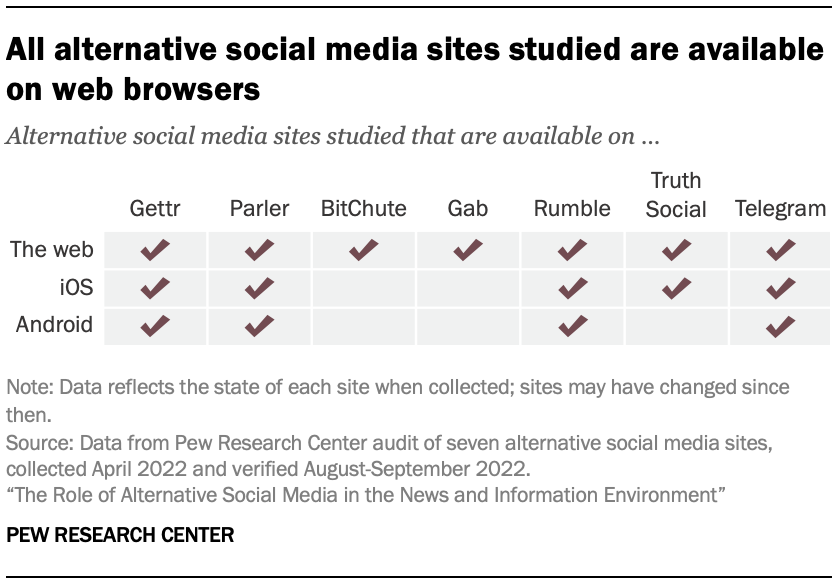
Like most other social media sites, users can access any of these sites through a web browser, and generally can read posts, search and publish their own posts. Five have iOS apps, while four have apps available in the Google Play store.
Some sites do not have apps for mobile devices. Apple and Google, which are the main sources of apps for iOS and Android devices, control what apps are available on their individual stores and have publicly expressed concerns about the content on some of these alternative social media sites.
After the Jan. 6, 2021, attack on the U.S. Capitol, both companies temporarily pulled Parler off of their stores because organizers reportedly used the app to help plan the riot (Parler also was dropped by its internet hosting service). Parler returned to the Apple App Store later that year after enhancing its content moderation and did not return to the Google Play Store until September 2022. Truth Social also has an app available on the Apple App Store, but as of September 2022 Google has requested more moderation before allowing it on their Play Store.
Google removed Gab for hate speech in 2017, while Apple has repeatedly rejected the app for similar reasons. And in August 2022, Telegram CEO Pavel Durov said that Apple was delaying approval of an update to the Telegram mobile app, though this turned out to be because Apple objected to a new feature.




